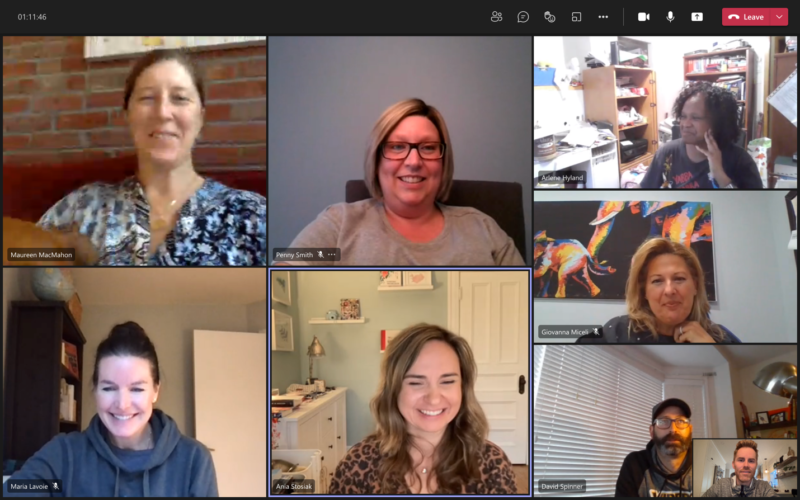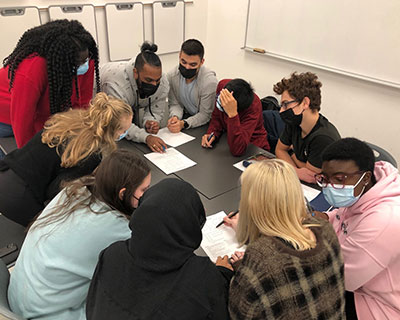Future healthcare workers learning together through Dawson’s unique Interprofessional Education
Dawson College may be in the news this week because funding for a new pavilion was scuttled by the Quebec government, but the driving principles behind the need and purpose of the facility remain for an innovative, unique-in-Quebec Interprofessional Education Pedagogy (IPE) project.
For the past four years, faculty in Dawson’s seven health and social services programs have been researching, developing, and implementing learning activities for the classroom and beyond the classroom to create a collaborative culture among Quebec’s future nurses, diagnostic imaging technologists, medical lab technologists, medical ultrasound technologists, physiotherapy technologists, radiation oncology technologists and social work technologists.
Research proves IPE improves patient care
“Canadian research over the past 20 years proves that patient care is improved by this IPE approach to training healthcare workers,” said Tim Miller, IPE project lead and faculty, Physiotherapy Technology.
The IPE team, made up of teachers from seven programs, has generated a culture shift of collaboration and communication among the more than 800 students and 130 teachers and support staff across these programs at Dawson.
What the students think
Radiation Oncology student Eden Harrell participated in a role clarification activity in the fall 2021 semester along with students from Physiotherapy Technology, Social Service, and Medical Ultrasound Technology.
“I knew the basics of what each profession did, but this activity helped me realize there is a lot of overlap between each one,” Eden said.
The group of 130 students shared what their profession is about, expanded on a day in the life of someone working in their respective fields, and were able to witness some of each discipline’s specialized equipment in use.
Social Service student Alina Tariq commented after the activity: “I had more clarification about each healthcare worker and it was better because we were able to ask questions and get answers immediately.”
Fun learning activity
One of the faculty involved in the activity, Ania Stosiak from Medical Ultrasound, said: “It was inspiring to see the students from four different healthcare programs explain to each other what their roles and responsibilities are in their individual professions, and then discover common links to reflect upon in the future. They had fun learning and that’s what it’s all about!”
This is just one of the many ongoing initiatives of the IPE project. Over the past year, the team has shifted from the exploration phase of the project into an action-based phase where a multitude of offshoot initiatives are in development, including the creation of a student committee, an ECQ grant for a two-year project to create common medical cases across the seven disciplines, the creation of common learning activities and assessments during students’ final internship courses, development of new training and expertise on medical simulation and debriefing, a new community-building Instagram account called The Hallway (@thehallwayipe), a podcast and more. The IPE project also has a webpage: https://www.dawsoncollege.qc.ca/interprofessional-education/
Any project the team tackles always comes down to providing students an opportunity to learn with, from, and about each other. Research has demonstrated that the more students within medical technology and health education learn about each other, the more they collaborate when they enter the workforce.
Getting to know people in other programs
One of the members of the IPE team, Nursing instructor Arlene Hyland, said: “It’s been great to be on this team because I now know people outside of my discipline and I’ve been able to make connections”.
More IPE learning activities will take place this semester as the project continues to move forward.
The new pavilion project of Dawson College was a response to the need for more space for our current level of students across all programs. The vocation of the pavilion is to house the seven health and social services programs as well as a Clinique École and a simulation centre.

Dawson’s Interprofessional Education team includes teachers from all seven healthcare and social services programs
The pavilion project is:
for the benefit of all Quebecers
improving the capacity of the healthcare system
an investment in education and healthcare, not just the future of healthcare
providing an optimal and modern training environment for future healthcare workers in Quebec
providing the space for Dawson students that all students in CEGEP are entitled to have
not adding more students to the College
not for anglophones only; students are from all backgrounds. People who benefit from the care of our healthcare program graduates are from all backgrounds and live in all regions of Quebec.
If the pavilion project of Dawson College is cancelled, all Quebecers lose:
- A Clinique École that would relieve pressure on local clinics and hospitals in Montreal by providing nursing, physiotherapy, diagnostic and ultrasound imaging, and social services to all Quebecers under the RAMQ
- This community clinic would boost the capacity of the healthcare system in Montreal by providing care to thousands of patients every year
- A new modern facility that would provide the best up-to-date training to future healthcare workers in Quebec
- An attractive facility that would help promote healthcare professions to prospective students who are badly needed to fill critical jobs in the health care system
- The seven health and social services programs at Dawson cannot fully adopt the best practices in Interprofessional Education and will have to make do with the outdated facility
No matter what happens with the pavilion project, Dawson still has:
- built a new collaborative culture among its students and faculty in healthcare and social services programs
- an innovative Interprofessional Education pedagogy
- 7 high-quality health and social services programs that are continuing to build the capacity of the healthcare system in Quebec
About Dawson’s Health and Social Services Programs:
- Dawson trains a significant amount of Quebec’s future healthcare workers
- Every year Dawson provides a fresh crop of 220 healthcare and social service workers
- Dawson has the most health and social services programs of any CEGEP in Quebec
- Graduates work in health facilities across Quebec
- All Dawson students in all day programs must pass French courses to graduate
- Some of our healthcare students must pass an additional French exam to work in their profession
- Students are from diverse backgrounds reflecting the population of the city of Montreal: anglophone, francophone, allophone
- Among the reasons that francophone students choose Dawson is to improve their English so they can stay up to date in their profession
- Anglophones who go to CEGEP in English are more likely to stay in Quebec and contribute to Quebec society
- Francophones who go to CEGEP in English acquire a higher level of English making them more marketable; they do not become a different person or lose their French language and identity. It is quite common to hear students speaking to each other in French in the corridors of Dawson



